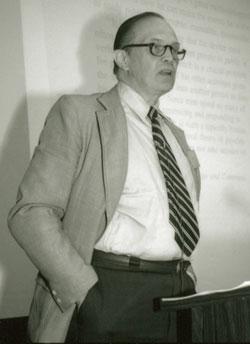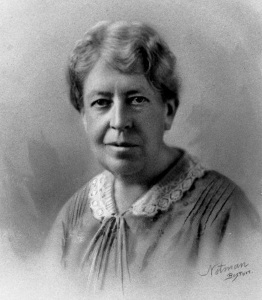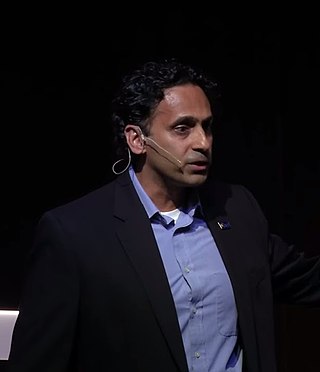Related Research Articles

George Armitage Miller was an American psychologist who was one of the founders of cognitive psychology, and more broadly, of cognitive science. He also contributed to the birth of psycholinguistics. Miller wrote several books and directed the development of WordNet, an online word-linkage database usable by computer programs. He authored the paper, "The Magical Number Seven, Plus or Minus Two," in which he observed that many different experimental findings considered together reveal the presence of an average limit of seven for human short-term memory capacity. This paper is frequently cited by psychologists and in the wider culture. Miller won numerous awards, including the National Medal of Science.

Mary Whiton Calkins was an American philosopher and psychologist, whose work informed theory and research of memory, dreams and the self. In 1903, Calkins was the twelfth in a listing of fifty psychologists with the most merit, chosen by her peers. Calkins was refused a Ph.D. by Harvard University because of her gender.
Timothy DeCamp Wilson is an American social psychologist and writer.
Robert Rosenthal is a German-born American psychologist who is a Distinguished Professor of Psychology at the University of California, Riverside. His interests include self-fulfilling prophecies, which he explored in a well-known study of the Pygmalion effect: the effect of teachers' expectations on students.

Michael I. Posner is an American psychologist who is a researcher in the field of attention, and the editor of numerous cognitive and neuroscience compilations. He is emeritus professor of psychology at the University of Oregon, and an adjunct professor at the Weill Medical College in New York. A Review of General Psychology survey, published in 2002, ranked Posner as the 56th most cited psychologist of the 20th century.
Floyd Henry Allport was an American psychologist who is often considered "the father of experimental social psychology", having played a key role in the creation of social psychology as a legitimate field of behavioral science. His book Social Psychology (1924) impacted all future writings in the field. He was particularly interested in public opinion, attitudes, morale, rumors, and behavior. He focused on exploration of these topics through laboratory experimentation and survey research.

Lisa Feldman Barrett is a University Distinguished Professor of psychology at Northeastern University, where she focuses on affective science. She is a director of the Interdisciplinary Affective Science Laboratory. Along with James Russell, she is the founding editor-in-chief of the journal Emotion Review. Along with James Gross, she founded the Society for Affective Science.

Mahzarin Rustum Banaji FBA is an American psychologist of Indian origin at Harvard University, known for her work popularizing the concept of implicit bias in regard to race, gender, sexual orientation, and other factors.
Peter Salovey is an American social psychologist and current president of Yale University. He previously served as Yale's provost, dean of Yale Graduate School of Arts and Sciences, and dean of Yale College. Salovey is one of the early pioneers in emotional intelligence.
William Kaye Estes was an American psychologist. A Review of General Psychology survey, published in 2002, ranked Estes as the 77th most cited psychologist of the 20th century. In order to develop a statistical explanation for the learning phenomena, William Kaye Estes developed the Stimulus Sampling Theory in 1950 which suggested that a stimulus-response association is learned on a single trial; however, the learning process is continuous and consists of the accumulation of distinct stimulus-response pairings.

Nancy L. Segal is an American evolutionary psychologist and behavioral geneticist, specializing in the study of twins. She is the Professor of Developmental Psychology and Director of the Twin Studies Center, at California State University, Fullerton. Segal was a recipient of the 2005 James Shields Award for Lifetime Contributions to Twin Research from the Behavior Genetics Association and International Society for Twin Studies.
Richard E. Petty is university professor of psychology at Ohio State University.

The Princeton University Department of Psychology, located in Peretsman-Scully Hall, is an academic department of Princeton University in Princeton, New Jersey. For over a century, the department has been one of the most notable psychology departments in the country. It has been home to psychologists who have made well-known scientific discoveries in the fields of psychology and neuroscience.
Wendy Berry Mendes is the Sarlo/Ekman Professor of Emotion at University of California, San Francisco, United States. She was previously the John L. Loeb Associate Professor of Social Sciences at Harvard University. Her expertise is in the area of emotion, intergroup relationships, stigma and psychophysiology. At UCSF she is the founder and director of the Emotion, Health, and Psychophysiology Lab in the Department of Psychiatry.
Norman Bruce Anderson is an American scientist who was a tenured professor studying health disparities and mind/body health, and later an executive in government, non-profit, university sectors. Anderson is assistant vice president for research and academic affairs, and research professor of social work and nursing at Florida State University. He previously served as chief executive officer of the American Psychological Association (APA), the largest scientific and professional association for psychologists in the United States. Anderson became the APA's first African-American CEO when he was named to the post in 2003. He was the editor for the APA journal American Psychologist. Prior to joining APA, Anderson was an associate director of the National Institutes of Health (NIH) and held other roles in academia.
David O’Keefe Sears is an American psychologist who specializes in political psychology. He is a distinguished professor of psychology and political science at the University of California, Los Angeles where he has been teaching since 1961. He served as dean of social sciences at UCLA between 1983 and 1992. Best known for his theory of symbolic racism, Sears has published many articles and books about the political and psychological origins of race relations in America, as well as on political socialization and life cycle effects on attitudes, the role of self-interest in attitudes, and multiculturalism. He was elected a fellow of the American Academy of Arts and Sciences in 1991.
Janet Allison Taylor Spence was an American psychologist who worked in the field of the psychology of anxiety and in gender studies.

Mahlon Brewster Smith was an American psychologist and past president of the American Psychological Association. His career included faculty appointments at Vassar College, New York University, University of California, Berkeley, University of Chicago and University of California, Santa Cruz. Smith had been briefly involved with the Young Communist League as a student at Reed College in the 1930s, which resulted in a subpoena by the U.S. Senate in the 1950s. That activity caused him to be blacklisted by the National Institute of Mental Health for ten years without his knowledge.
John E. Pachankis is an American clinical psychologist. He is the Susan Dwight Bliss Professor at the Yale School of Public Health. His research has examined the nature of stigma and its impact on mental health and social functioning. He specifically studies the psychological experiences of LGBT individuals, including processes of identity formation and identity concealment; the cognitive, emotional, and behavioral consequences of stigma-based rejection and exclusion; and affirmative mental health treatments for LGBT populations.

Regan A. R. Gurung is an American psychologist and award-winning author.
References
- ↑ "Mark L. Hatzenbuehler". Department of Psychology. Harvard University. Retrieved 2021-11-16.
- ↑ "Mark Hatzenbuehler". Association for Psychological Science. Retrieved 2021-11-16.